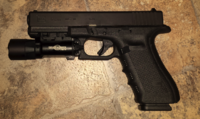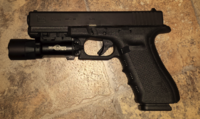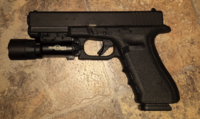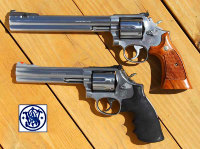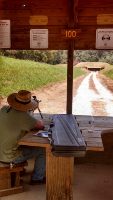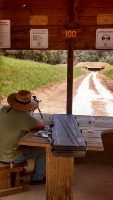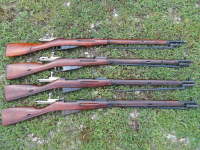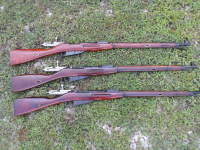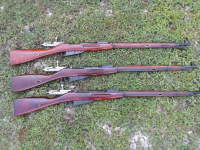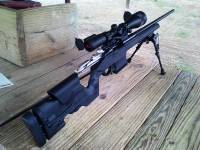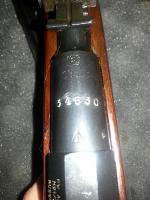Let me start with saying that the gun/weapon laws in Austria are pretty relaxed compared to most of the EU still.
I am not a lawyer and this is no legal advice, i do not guarantee that all is correct however i ensure you i tried my best to compile and verify it.
Although not guns i decided to include knives as well in this article as the Austrian law is different than in most EU countries as well, both due to history in hunting and general acceptance in the population.
Knifes are sorted into 2 categorys:
– Knifes designed as weapon
– Knifes designed as “everyday objects”
Of course this is hard to distinguish as most knives can be used as weapon and as “everyday object”, however in reality this has no influence:
Knifes, regardless if Weapon or “everyday object” can be bought, owned and carried in public (both concealed and unconcealed) by any person over 18
with no “weapon ban” (civil instead of military service as example). Unlike in Germany and Italy the size of the knife and it’s mechanism do not matter in Austria – OTF knifes, Switchblades, double side sharpened, Automatic knifes, swords, machetes etc. – are all legal to buy, own and carry with no restrictions.
In the more rural areas it is not uncommon that many carry a Swiss knife (“Schweizermesser”) or a Leatherman/toolkit. I usually carry an OTF knive.
Open carry of swords or guns (restricted or not) even if permitted is however not recommended in cities as the police can still charge/ticket/annoy for “public disturbance”.
Airsoft is popular in Austria, in particular with younger people. Unlike in Germany there are no restrictions on attachments (ex. Lasers) and no full-auto ban.
They are regardless of system (gas, electric, manual etc.) not regarded as weapon but as “firearms related products” and restricted to age 18 and over.
Airsoft toys with less than 0.07 joule are not age restricted – This does not apply if gas operated.
Air rifles follow the Airsoft laws and are sold to anyone 18 or over if less than (including) 6mm caliber, else they are category C weapons.
Gas guns and starting pistols are legal to buy, own and carry concealed and open (with no permit) in all systems (revolver, semi automatic, full automatic etc.) for anyone over 18. No registration or wait time is required. They are widely available, anonymously, in weapons stores (which tend to be either in city centers or shipping centers in Austria).
Austrian firearm law is based on 3 (formerly 4) categories which group firearms based on technology:
-
Category A guns are illegal to own unless a permit is issued (very rare, usually only to reputed collectors, politicians and diplomatic staff as well as some security companies).
It includes (due to a shooting ~40(?) years ago) all pumpguns (“Vorderschaftrepetierflinten”, German for Pumpgun which means only smooth-barrel pump-action operated guns) and further fully automatic rifles, silencers and concealed weapons (ex: gun in umbrella).
Some heavy calibers (.50 BMG as example) are in this category as well, which means all guns in this calibers are automatically category A, otherwise some would be category C/B and could be bought with a B permit.
It is nearly impossible to obtain a permit for category A weapons except for grandfathered pumpguns which are required to be turned to the authorities in case the owner dies (no inheritance right, no compensation), these cannot be sold privately either.
Due to a loophole (which in reality is prety much intended) category A weapons owned by a category A permit owner can be operated by non-permit owners on a police approved/registered range which can be acquired easily in most states.
-
Category B guns are handguns and semi automatic weapons (both rifles and shotguns, semi automatic shotguns with pump action backup are category A).
This weapons are legal to own with a permit (“Waffenbesitzkarte”, Weapon ownership card).
A permit can be acquired by anyone 21 (18 with government agreement, rare in most states) and over, EU citizen (was required to be changed, discrimination laws), obligatory military service fulfilled or deemed unfit (but not civil service (“Zivildienst”) which automatically results in a weapons ban for 10years (formerly 15, ban now is often reduced/removed on request for cat. C), no previous weapons ban, by providing a reason (“self defense” is a valid reason which requires no more background information) and passing a psychological examination by a doctor of his choice.
The police then verifies the security of the future gun storage which must be “secure” (yes, that is pretty much the law.), generally a small safe or any other securely lockable box/closet is sufficient.
Unlike in Germany there is no requirement to store ammo and guns in different enclosements (or unloaded) and no safe/room standard certification is required. This security check-up is repeated all 5years. Most safes for sale are German editions and thus are certified.
After a waiting time (usually between 1 and 8 weeks) a permit of usually 2 spaces in granted, which entitle the holder to buy/own 2 category B guns.
Private sales are not subject to former verification of validity of WBK/WP (no liability unless very negligient), stores do not online verify WBK/WP owners (yet).
If required the permit can be extended to more spaces indefinitely, however self defense is not regarded as valid reason in most cases (depends on state/county) and a detailed explanation can be requested by the authorities.
For example a collector could be questioned about the history of his collection or a sport shooter could be asked to provide result lists.
It is rather common to appeal decisions and it is also rather common that negative ones are invalidated in that case.
Available firearms are limited by federal approval, most rifles with a military/full automatic (design) base are required to be redesigned to make conversions to full automatic entirely impossible.
-
Category C guns are rifles (all rifles over 90cm lenght/45cm barrel and not semi automatic) and shotguns (only break action) and by far the most interesting rifles for the average Austrian!
Unlike in nearly all of Europe these are legal to own for anyone over 18, EU citizen, obligatory military service fulfilled or deemed unfit with an address and registration (ZMR, our ID number system) in Austria, only a basic background check must be passed.
Private sales need to be registered at a gunsmith up to 6 weeks after the sale, this data is stored in a central government database since 1st October 2012.
Before this date a registration at private sales was not required and stores only registered in their own systems with no centralization (“Waffenbuch”, weapons book, often really a hardcopy book).
When bought in-store the registration is usually included in the price and will be done on-site along with the usual background check. For external C weapons it is usually 15EUR, B 25EUR.
Storage must be secured, in a single person enviroment no special storage is required, same is applicable if the other persons are legally able to own category C weapons.
Currently a closet with a lock is sufficient, the storage is not verified by the police as with category B.
This heavily depends on county – I was fined for having guns ‘insecure’ in a secondary lockable room (my bedroom) while living alone.
There is a 3day waiting period for the background check unless the buyer has a category A/B permit or a hunting license, this does not apply to private sales.
-
The former category D was merged with category C at the 1st October 2012 due to the law change implementing the central category C register, it included shotguns (break action only) with smooth barrel and required age 18 or over, a background check as well as 3day waiting period but no registration.
Old unregistered category D weapons are not grandfathered and required to be registered, otherwise the owner might be fined/prosecuted when found – currently (11.2013) this seems to be not enforced in any state, generally police will recommend to register the weapon only.
For the last part let’s get to: Carry & Ammo!
Handgun ammo as well as some specific rifle ammo requires a A/B permit or a hunting license to buy in store, private sale is legal between 2 permit holders only (except police approved shooting areas).
If one stores more than 20000 rounds of any caliber a notice is required to the state police – Storage is possibly verified in this case, a further notice is required each 20k more rounds.
Other unrestricted private and store ammo sales are not registered or subject to ID check (other than age verification), no amount restrictions are in place.
A store may report suspicious purchases to the police, however this has no legal difference in case of illegal usage so it is usually not common.
By default concealed and open carry of A/B/C firearms is legal at home and work only, shooting at home is legal if it is made sure that no projectile can leave the area (basement for example), handling of category A/B firearms is illegal for anyone without a permit unless on a police approved range (this ‘certification’ can be obtained for home shooting areas as well in most states).
Outside work/home carry of weapons other than starting/gas guns and airsoft weapons requires a permit (“Waffenpass”, Weapons passport), carry permits require a reason (self defense is generally not accepted unless there is a real verified threat).
The permit requires no category A/B license and automatically also entitles to ownership of the weapon or another spot for this A/B weapon, storage requirements for category A/B weapons are the same as for a category B permit.
It depends on the state/county how hard it is to obtain a permit, generally Vienna and Vorarlberg are very hard, Niederösterreich (Lower Austria) and Steiermark (Styria) are seen as more easy.
It is also possible to obtain a carry permit for work reasons (as guard for example), these are usually restricted to the worktime and easier to obtain with employer recommendation.
Hunters with a hunting permit automatically have the right to carry on their (or the legally used) hunting area.
Sources:
Austrian law books
IWOE.at

